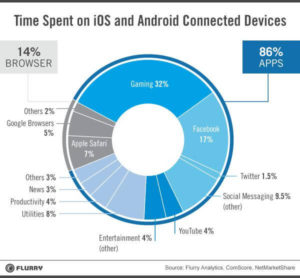Why Your Business Needs A Mobile App
Mobile apps in combination with business, and why your business should consider implementing a mobile app.If you think that businesses like Uber or Walmart are the only ones that benefit from a mobile app, you may want to think again! More and more small and midsize businesses are following the mobile trend and incorporating mobile apps into their digital strategies, after all there are many benefits of mobile apps for businesses. Understanding that an effective mobile strategy involves more than just a mobile-friendly website. In fact, these days you’ll notice that many small businesses you interact with in your everyday life have their own dedicated mobile app — be it the corner coffee shop or the beauty spa downtown. These companies are ahead of the game when it comes to taking their marketing to the next level.
Smartphone usage has been on the up and up. Nearly three-quarters of Americans check their mobile phones at least once per hour, according to a Gallup survey. Almost all – 90 percent – of that mobile-phone time is now devoted to using apps, analysis reveals. Americans now spend more time looking at their mobile phones than they do watching television. A recent study by mobileinsurance.com has revealed that the average person spends 90 mins a day on their phone. That figure may not sound like a lot but that amounts up to 23 days a year and 3.9 years of the average person’s life is spent staring at their phone screen.
In case you are still not sure why anyone would want to implement their own mobile application for their business, here are the benefits of going down this path sooner rather than later.
Benefits of Mobile Apps for Business:
Increase your business visibility to customers at all times:
By your company having a mobile app you are visible to your customers 24 hours a day 7 days a week. If a user want’s to purchase and or see what’s new they are a click away no matter the day or time. Statistics show that in the US, the average person spends more than two hours a day on his or her mobile device. Globally, there are more than a billion smart phones. So, the fact that people these days spend more time on phone than on PCs is great for businesses — if you adjust your marketing plan to match this shift. Evidently, your business will be exposed to numerous eyeballs if you have mobile presence. Your image, name and logo needs to be seen when these masses scroll, unlock, and do whatever they do while on the go.
Humans have their devices either on their fingers, palms or pockets. We like using them when waiting at the bus stop, riding to and from work and even when watching TV in the evening. All these are suitable times to send a notification to prospective clients.
If you offer internet-based services or products, use a mobile app to make sales. Make it possible for clients to do the same things that they would conventionally do when sitting in their offices. Offer valuable solutions for customers remotely. The more opportunities you offer potential customers to reach you, the better off your business will be
Create a Direct Marketing Channel
Mobile apps bring a lot of information to your business about your customers. Examples are demographics and geographical locations. More importantly, you can give a lot of information to your clients about your products and services. Examples are news feeds, product specifications, new features, prices, promotions and special rates. You can know the preferences of certain customers and meet their individual needs. The fact that you are marketing more directly is a huge advantage.
Apps serve many functions: they can provide general info, prices, booking forms, search features, user accounts, messengers, news feeds, and much more. One of the biggest benefits of having a mobile app is that all the information you’d like to provide to your customers – including special sales and promotions – is right at their fingertips. Through push notifications you’re getting even closer to a direct interaction, and can easily remind customers about your products and services whenever it makes sense.
Provide Value to Your Customers
People tend to use apps as part of their daily routine. For example, users like to visit retail apps to see if there are any special offerings or sales. The advantages are open, two-way and ongoing communication, including push notifications that enable on-demand- you are giving users updates and or special incentives for having your app. Talking about on-hand information, how about digitalizing that loyalty program you have in place? Instead of sticking to the old point-collection card, make it possible for your customers to collect their rewards via your mobile app. The result? More downloads and more return customers. (Check out PunchMe, a service that lets you create smartphone-based loyalty programs.)
Do you have a loyalty program? Why not make it digital using a mobile app? You can move from the traditional reward collection to the smart phone and other mobile devices. As mentioned earlier, more people are glued to their mobile phones than ever before. Customers are interested in valuable products and services. With so many outlets offering the same products, it can be difficult for them to make a decision. A mobile app can nudge clients to your store. For example, use an area-sensitive push message on your app. When clients walk near your store’s physical location, they get a notification inviting them to your store. Curious shoppers will flock your store to see what you have to offer. This approach has been effective for brick-and-mortar businesses. In addition, send a thank-you notification to your clients after making a purchase.
Build Brand and Recognition
By being visible to users 24/7 this allows you to build your brand and company through the mobile app. How do you want users to perceive your company? When you design and develop your app, it is truly a blank canvas that you can do anything with- think of a mobile app as an extension of your brand. Making sure that your users still see the same value that you have on different platforms but on a mobile app. With users having your app on their phone, they will more than likely go to your company whenever they need your services next- you will be top of mind because you are already an active user/ app on their home screen. A mobile app for your business can greatly contribute to your brand awareness. I’d like to break this topic down into two aspects, the combination of which will make your app a true winner:
- Brand. A mobile app is like a blank billboard sign. You can do what you want with it; you can make it stylish, hip, functional, shocking, or informative. But what you really want to do is create an app that has features your customers will love, while at the same time is well branded and beautifully designed.
- Recognition. The more often you can get customers involved with your app, the sooner they will be inclined to buy your product and/or service. In advertising this is called the “effective frequency”: as a rule of thumb, hearing and/or seeing your brand approximately 20 times is what will get you truly noticed.
Whether your business is new or rebranding, you can enhance its recognition using a mobile app. Simply create an app with likeable features and you will mesmerize your audiences. Instead of putting up an expensive billboard, construct a functional app. After all, not everyone actually pays attention to or heeds the messages displayed on billboards. Find a way to get your clients involved in your app regularly. The more often they interact with it, the more they will actually like the products or services it sells. This rule of the thumb in advertising is called effective frequency. It states that if customers see the brand more than 20 times, then it is truly noticed.
These days, mobile apps come with a sharing option where users can share your communication with their friends. It is like a friend telling you about a great service or product he or she bought somewhere. Studies indicate that referrals and third-party sales are among the most valuable marketing strategies.
Improve Customer Engagement
Having a help desk feature within your app can really make a difference in the way you communicate with your customers. For example, OpenTable, built its entire business model around this principle. Instead of calling a restaurant for a table, you can book it with less than five clicks on their platform. Now think about it- how many customers would prefer to communicate with you via text than via a phone call? Most people nowadays prefer all communication at the touch of a fingertip. Remember by having this convenience you are allowing users to engage, enjoy the easy use which provides customer loyalty. No matter whether you are selling flowers or spa services, your customers need a way to reach you. Having a messaging (or help desk) feature within your app can really make a difference in the way you communicate with your customers. Think about it: OpenTable, for example, built its entire business model around this principle. Instead of calling a restaurant for a table, you can book it with less than five clicks on their platform. Now think about it: How many customers would prefer to communicate with you via text than via phone?
All clients need a way to reach the business that sells a product or service that they are interested in. If you are unreachable, you run the risk of losing customers. A mobile app therefore comes in handy at enabling this reach. Have a help desk on the mobile platform where customers can post their questions, orders, comments and complaints. If you can reply to all their communication personally, then your customer engagement is great. Make the booking or ordering procedure as simple as possible yet secure. People are discouraged by lengthy procedures. They might even find it easier to click the ‘Back’ button than the ‘Next’ button.
Stand Out From the Competition
These days mobile apps at the small business level are still rare, and this is where you can take a big leap ahead of your competitors. Be the first in your neighborhood to offer a mobile app to your customers. They’ll be astonished by your forward-thinking approach! The fact that a mobile app sets you apart cannot be overemphasized. Take advantage of this effective communication and marketing tool while it is still rare. By the time your competitors are realizing its importance, you will have grabbed almost the entire market share. No matter what you sell, you can take a commanding role among your peers. Just by a tap of a button, your clients are able to see your products and services. That mobile apps are fast, easy, and simple to operate is a fact you need to capitalize on. This ease can drive customer engagement and loyalty to an unprecedented level.
Cultivate Customer Loyalty
One of the most important reason why you should consider building your own mobile app for your business is customer loyalty. With all the noise out there — roadside banners, billboards, flashing signs, newspaper ads, flyers, coupons, websites, website banners, Facebook ads, and email marketing — we slowly lose our impact on customers because of the immense amount of advertising surrounding us all. It’s time to go back to making a true and sincere connection with your customers, and making them a loyal lover of your product and/or service. I am not saying a mobile app is going to save your business, but it can be a way of staying closer to your customers, and being just a “fingertip” away at all times.
A mobile app is going to be a standard component of any business in the future. The choice you make today is going set the foundation for the future of your business. It’s on you to decide whether you’d like to be one of the first.
How many customers come back to your store or office for a second purchase? This is an important aspect of business that you must cultivate. Customer loyalty can be achieved when you constantly remind your clients about your existence and the kind of products or services you sell.
There is already too much advertising out there. Examples are billboards, roadside banners, newspaper ads, flashing signs, flyers, website banners, coupons, email and social media marketing. Are you going to add your communication in these crowded places?
Your message runs the risk of getting lost or forgotten amidst all this noise. Therefore, take a step back and rethink your marketing and ad strategy. A mobile app makes a truthful and sincere connection between your business and your clients. The fact that it is closest to the person means increased recognition and loyalty. Simply put, you are at their fingertips.
Convinced yet? I am, for sure! Now that you have gotten a taste of the numerous benefits of your own business mobile app, where are you going to start? You can start right here at Ausphere!
Turn Your App Into a Social Platform
Integrate numerous social features into a mobile app. A study once revealed that most people on social media just log in to see what their friends are saying. Incorporate this idea into your marketing strategy so that people actually see your brand while they catch up with their friends. Include features like in-app messaging, comments, likes and photo-sharing capabilities. Additionally, enable logging in to the app via Facebook and Twitter. This approach has proven effective in increasing customer engagement, repeated sales, retention and monetization.
Complement Your Website with Mobile App
Many marketers operating on a shoe-string budget usually ask this question — “Do we need an app if we have a functional website?” The truth of the matter is that a mobile app complements the capabilities of a website. Where a website attracts new customers, a mobile app creates customer loyalty. A website needs clients to open a browser and enter the website URL. On the other hand, all a mobile app needs is a single touch on the screen of a smart device. A website is a great platform to offer information and to post content such as copy, videos and photos. However, it may not enable the two-way communication that an app boasts of.
Most People Are on Mobile
It does not matter what service or product you sell. Having a mobile app is a must these days. Since 2008, the average mobile phone user in the world spends three hours on the phone. More importantly, the three hours daily are usually spent interacting with mobile apps. In 2014, the number of people using their mobile phones surpassed the number of desktop users. Google released research findings on the use of mobile apps in 2013. The research involved travel, health, fashion, restaurants, home, garden and automotive. It stated that three in 10 customers started a purchase path from a mobile app. These statistics emphasize why you need to go mobile. Do not limit your presence to a responsive website. The danger here is what marketers call the “buy and bye” phenomenon. This scenario is where a customer finds a great product, purchases it and leaves, never to come back. On the other hand, you run the risk of never finding customers if you limit yourself to a mobile app. Evidently, these platforms complement each other.
Conclusion
Having a functional website is the place to start. After attracting new customers, urge them to download your app on their mobile devices. After that, use the app to generate profitable opportunities. Create engagement by encouraging user reviews and interactions. As you build brand loyalty, expand your reach to social circles and deliver personalized shopping experience.






